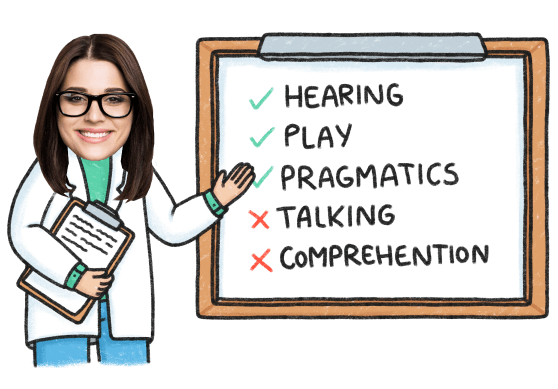Does My Child Have a Speech Delay?
Jan 31, 2022 A speech delay is a kind of developmental delay in which your child appears to be a “late talker.” Your child may pronounce words incorrectly or sound like they are stuttering because they are having difficulty with the actual process of making sounds. This can be due to a delay in the development or use of the speech structures which produce speech.
In This Article
A speech delay occurs when your child’s speech develops in the correct sequence, but at a slower pace than their peers. The Speech Blubs app has a free screener which you can use if you feel your child is having difficulty making speech sounds and talking correctly. The screener gives you a personalized report with actionable advice specifically for your child. Download the Speech Blubs app and fill out the free SLP-generated screener!
Delay vs. Sound Disorder
A speech delay is not a speech sound disorder (SSD). A delay occurs when your child’s speech develops in the correct sequence, but at a slower pace than their peers. A speech sound disorder is when your child’s speech errors are not “typical,” and are unusual in sound and pattern. You can learn more about the differences between a speech delay and speech sound disorder by clicking on the following link.
Speech vs. Language Delay
Speech and language delays are the most common type of developmental delays, but they are not the same thing.
Speech refers to how your child physically speaks and the speech sounds that they make. In order to speak correctly and produce speech, your child needs to have well-formed, speech structures that work correctly. These include their:
- Lips
- Teeth
- Tongue
- Jaw
- Vocal cords
- Lungs
- Etc.
If these structures haven’t fully developed or don’t work as they should, then your child’s ability to correctly speak will be disrupted. Your child will be slow to pick up words and lack the ability to correctly shape their mouth to form words.
Language, on the other hand, refers to the meaning of what we say and whether your child is able to understand and express meaning in their communication attempts.
Your child may have a speech delay, a language delay, or even a combination of both. Speech and language are independent stages, but sometimes the presence of one can mask or exacerbate the presence of the other.
Spot the Early Signs
Common features seen in children with a speech delay include:
- Uses a limited number of sounds
- Struggles to link two or more sounds together
- Speech is unclear and difficult to understand
- Late in developing specific sounds in words
- Struggles to interact and get messages across successfully
- Regular breakdowns in communication
- Frustration at not being understood
These features are explained in here:
The most practical method of identifying a speech delay is to compare your child’s speech with the age-appropriate norms described by evidence-based speech development milestones.
Remember, speech delays are different from language delays, so make sure you’re looking at the correct norms for your child. If you aren’t sure what those norms are, then our free screener can help you with this.
Your child should be able to say certain sounds at certain ages. If they have reached a certain age and still cannot say sounds appropriate for their age, then they might have a speech delay.
Possible Causes of Speech Delay
- Hearing loss
- Ear infections
- Anatomical problems of the speech mechanism
- Functional problems of the speech mechanism
- Learning disability
- Developmental disorder
Treating speech delays isn’t a one size fits all thing. Sometimes your child might also have other factors that need to be considered, such as having apraxia, dysarthria, or even a speech sound disorder (articulation disorder, phonological process disorder).
Boost Your Child’s Speech Development!
Improve language & communication skills with fun learning!

How Speech Blubs can Help
Ninety percent of a child’s critical brain development happens by age 5, and Speech Blubs is perfect for toddlers who are just beginning to speak. The app is a unique problem-solving tool that uses positive screen time as a means of “copying” face-to-face interaction. The best part is that our app uses videos of real kids (the science of video modeling and mirror neurons) which makes it very similar to face-to-face video chatting which encourages children with speech delay.
Repetition is key . . . but it’s not very exciting. Thankfully, Speech Blubs makes repetition fun. Children can enjoy improving their speech through repetition without it feeling like work.
Early recognition of speech delay can help children overcome speech problems so that they can learn how to communicate well.
Our free screener is the ideal tool to use for early recognition of speech delay. If you don’t have the app, you can download the Speech Blubs for iOS or Android devices.
For more information about the app check our FAQs or write to us. Know that you have an ally in Speech Blubs and that our biggest success is seeing your child achieve their greatest potential.
